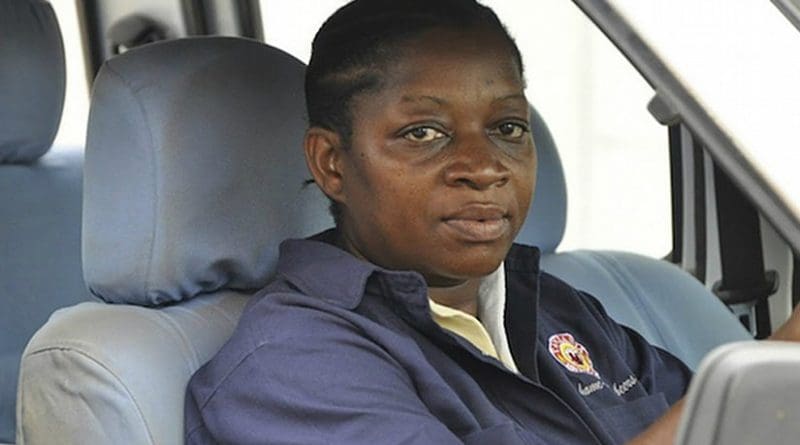Female Taxi Drivers Take To The Roads Of Dar Es Salaam
By IDN
By Kizito Makoye Shigela
Taxi driver Mwajuma Ramadhani adeptly steers her way through the crowded streets of the bustling Kariakoo business hub in Dar es Salaam. Suddenly, a motorcycle rider with two passengers cuts in, causing her to swerve abruptly to the right.
“You would have caused an accident had I not been careful,” she tells the rider, while he scowls at her, visibly shaken.
“I face these challenges almost every day,” says Ramadhani, hooting loudly at the rider. “I often ignore reckless riders like him. Just because it’s a woman behind the wheel, he’s trying to take advantage.”
As a female driver, 41-year-old Ramadhani is already among the few commercial drivers on Dar es Salaam’s busy roads, and she hopes to become her own boss in this city of about 4.5 million.
The sight of a woman from an affluent family driving her own car in Dar es Salaam surprises no one, but it is still a shock for male taxi drivers to see that they have female competitors.
Traditionally, taxi ranks in Tanzania’s largest city have been a male preserve but hundreds of female taxi drivers like Ramadhani are aspiring to own their own commercial vehicles under a new initiative – known as Women on Wheels – run by Africa International, a local organisation aimed at empowering women economically.
As part of the initiative, women are challenging traditional roles by training as taxi drivers and working in the male-dominated transport sector.
While women make a huge contribution to economies, whether in business or agriculture, they are often disproportionately affected by poverty and discrimination, ending up in insecure or low wage jobs, according to the United Nations.
Experts say that investing in women’s economic empowerment an help overturn this situation by setting women on a direct path towards gender equality, poverty eradication and inclusive economic growth.
The Women on Wheels project, which draws inspiration from the Nobel Peace Prize-winning Grameen Bank initiative launched in Bangladesh by Prof. Mohammed Yunus to help poor people escape from poverty through micro-lending, aims to help Tanzanian women follow suit.
Women on Wheels offers technical skills and self-empowerment training to enable women to work in a highly competitive transport sector.
While the number of women driving private cars has been increasing, local analysts say very few have attempted to work as taxi or bus drivers due to the fear of sexual assault or being hijacked.
Martine Gabone, Africa International’s Executive Director, said the initiative is aimed at opening up business opportunities for low-income women in Dar es Salaam to work in the transport sector and earn a decent living.
“Training women in commercial driving will give them the minimum tool required to participate in transportation activities for their economic well-being,” he told IDN, adding that “the role of women goes beyond cooking and caring for the family, they deserve a better income.”
The six-month training, which is being coordinated by the Surface and Marine Transport Regulatory Authority (SUMATRA), has attracted hundreds of participants.
According to Gabone, training is currently under way in Dar es Salaam and the trainees who qualify will be given assistance in securing bank loans for purchasing their own vehicles, with Africa International acting as guarantor of loans from local commercial banks.
“We will ensure that every woman who meets the criteria gets access to these empowerment loans and establishes her own business,” he stressed.
Richard Kivura, the project’s consultant, said that as part of its strategy Africa International is trying to increase the number of women running their own transport services as a way of addressing the existing gender gap in the sector.
Apart from the fact that “women are good drivers who always observe traffic regulations and are less likely to cause accidents,” Kivura said that the training, which covers driving theory and practice, basic mechanics skills and map reading, will enable women to be independent.
“The idea was to empower women to be a part of a driver ecosystem by developing a sustainable model and also helping these women grow as entrepreneurs themselves,” he said.
According to Kivura, the Women on Wheels project offers self-defence classes, as well as classes on gender equality, the legal rights of women and effective communication.
He noted that a similar initiative is also being implemented in Nigeria, in which low-income women are being encouraged to organise themselves into cooperative groups, learn driving and work as drivers in the lucrative commercial transport sector.
While high rates of crime in cities have pushed many women out of the driving profession, services such as Uber are beefing up safety measures through new technology, thus attracting more women to work as taxi drivers.
“People ask me how on earth can you become a taxi driver,” says Ramadhani, and “I just tell them that it’s my passion.”
Note: This report is part of a joint project of the Secretariat of the ACP Group of States and IDN, a flagship agency of the International Press Syndicate.

